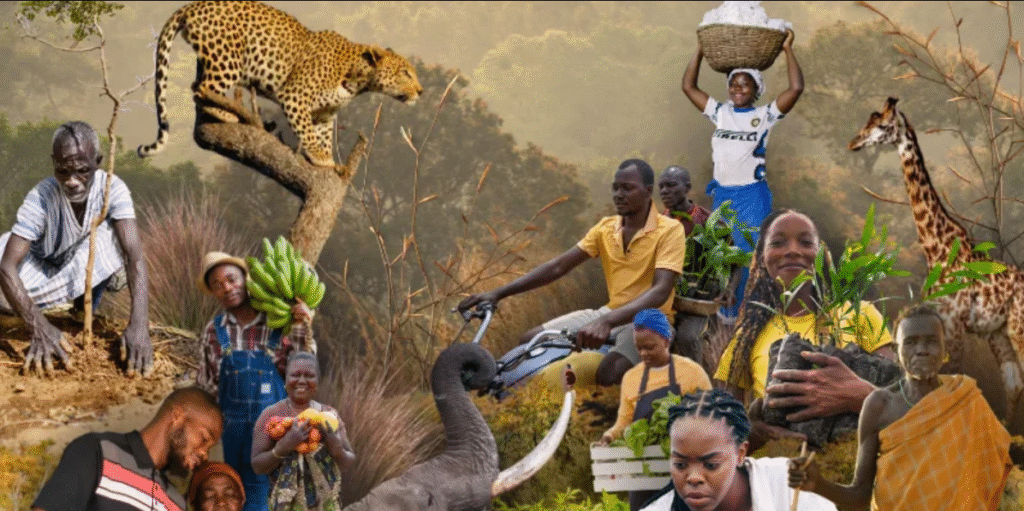Nairobi. At a time when Africa’s ecosystems face rising threats from climate change, population growth and resource degradation, experts, innovators, and communities are stepping forward to reclaim the continent’s landscapes and redefine its future.
This momentum was on full display during GLF Africa 2025: Innovate, Restore, Prosper, a landmark event held on 19 June 2025 in Nairobi, Kenya, and online. Organized by the Global Landscapes Forum (GLF) in partnership with CIFOR-ICRAF, the forum drew nearly 2,500 participants from 118 countries and reached more than 9 million people through social media.
What emerged from the sessions was a clear call: Africa’s green transition must be rooted in local wisdom, natural capital, and technological innovation, supported by policies that reflect the realities and ambitions of its people.
Harnessing Innovation and Artificial Intelligence for Restoration
Africa’s journey to ecological recovery is increasingly being driven by cutting-edge technologies—but with a human touch.
“AI will only work when we treat the farmer not as an end user, but as a co-creator,” said Esther Maina, Geospatial Developer at the Kenya Space Agency. Her statement emphasized that local knowledge, especially from smallholder farmers, must be integrated into the design of tech-based solutions.
Éliane Ubalijoro, CEO of CIFOR-ICRAF, underscored the need for wisdom in how Africa uses data. “When knowledge becomes actionable and applied, only then does it become wisdom… Africa already has immense natural capital. It’s our responsibility to bring intelligence, meaning and context towards a nature economy.”
Kate Kallot, Founder of Amini AI, echoed this by framing data as a bridge to trust and investment: “Data creates transparency, transparency creates trust, and trust accelerates investments. But this will only work if we treat our natural capital as a core economic driver.”
Restoring Africa’s Landscapes Starts with Rights and Respect
Speakers emphasized that restoring ecosystems is not just a matter of planting trees it starts with restoring land rights, dignity and voice to communities.
“Land rights are the foundation for Africa’s nature economy,” said Solange Bandiaky-Badji of the Rights and Resources Group. “The West may have the technology, but we have the resources. That should put Africa in a powerful bargaining position.”
From Tanzania, Joshua Laizer, co-founder of TACCEI and GLFx Maasai Steppe, highlighted the resilience of indigenous knowledge: “People living in drylands have survived generations of uncertainty by simply understanding their environment.”
Policies must serve people, not the other way around, argued Melyn Abisa of Youth4Nature. “We need enabling ecosystems that support restoration, because policies without people are just poetry.”

Prosperity Through Nature: From Aid to Investment
Experts at the forum pushed for a shift from dependency to economic empowerment through nature.
Peter Minang of CIFOR-ICRAF criticized the limited view of biomass that dominates current economic models. “We only capture 6–10 percent of biomass value. The rest is overlooked because we export everything raw.” He advocated for value addition and domestic processing to ensure that nature’s wealth benefits African communities.
Sellah Bogonko, CEO of Jacob’s Ladder Africa, offered a bold assessment: “Africa is not a charity case. With $6.5 trillion in natural resources, a youthful population, and 60 percent of the world’s renewable energy potential, Africa is the most compelling investment case globally.”
For Steve Misati of Youth Pawa, the message was equally clear: “Africa’s nature economy can sustain us. We don’t need to depend on foreign aid we are our own resource.”
The Urgency and the Opportunity
The stakes are high. More than 60 percent of Africa’s economy depends on its natural capital forests, water, land, and biodiversity. Yet 65 percent of productive landscapes are degraded, largely due to the climate crisis, insecure land rights, and underfunded restoration efforts.
As the population grows from 1.5 billion to 2.5 billion by 2050, so will the demand for food, shelter and jobs putting further strain on ecosystems.
But the opportunity is just as immense. Studies presented at the forum suggest that investing in landscape restoration can yield returns of up to 600 percent, along with significant social and ecological benefits. Moreover, up to 70 percent of Sub-Saharan Africa’s communities rely on forests and woodlands for their livelihoods restoration, therefore, is not a luxury but a lifeline.
GLF Africa 2025 was not merely a conference it was a rallying point for Africa’s restoration movement. It showcased how AI can amplify indigenous wisdom, how data can attract capital, and how nature can drive prosperity when local people are at the heart of the solution.
In the words of one participant, “This is Africa’s moment not just to restore its landscapes, but to reclaim its future.”



I simply couldn’t go away your website before suggesting that I extremely enjoyed the standard info an individual provide on your guests? Is gonna be again frequently in order to check out new posts.